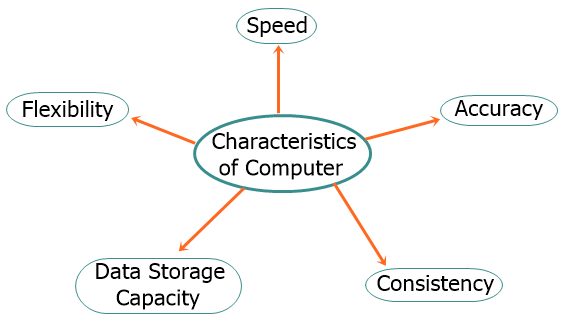- Computer Fundamentals Course
- Computer Fundamentals Tutorial
- Block Diagram of a Computer
- The Generation of Computers
- Types of Computers
- Classification of Computers
- Characteristics of Computers
- Applications of Computers
- Central Processing Unit
- Input Devices
- Output Devices
- Computer Memory and Types
- CD, HD, Floppy, and PenDrive
- Types of Computer Languages
- Types and Language Translator
- Number System with Types
- Decimal to Binary
- Decimal to Octal
- Decimal to Hexadecimal
- Binary to Decimal
- Binary to Octal
- Binary to Hexadecimal
- Octal to Decimal
- Octal to Binary
- Octal to Hexadecimal
- Hexadecimal to Decimal
- Hexadecimal to Binary
- Hexadecimal to Octal
- Algorithm and Flowchart
- Selection Sort
- Insertion Sort
- Bubble Sort
- Linear Search
- Binary Search
- Bitwise Operators
- Binary Number Addition
- EBCDIC & ASCII Code
- BCD, Excess-3, 2421, Gray Code
- Unicode Characters
Characteristics of Computer
A computer's "characteristics" refer to its qualities or features.
In spite of the fact that there are many distinct types of computers, which are classified according to factors such as their storage capacity and size, they all share certain qualities in common, which we called their characteristics.
As you are all aware, a computer has a great number of features or qualities; however, out of all of those qualities, there are five that are the most widely known. As a result, the following is a list of the five most important characteristics of computers:
And if we are going to discuss the graphical representation of the qualities that computers possess, then here it is:

Let us now briefly describe each of the five computer characteristics mentioned above, one by one, beginning with "speed." After going over these well-known aspects of computers, I went ahead and included three more aspects that, in their own way, are also well-known.
Speed
Speed is the first of the five major characteristics of a computer.
The speed of a computer device is very fast, as it can perform tasks in a few seconds that no amount of calculation or anything that a human being can do in an entire year or more.
2 gigahertz to 4 gigahertz is the speed range of a computer device.
Accuracy
The accuracy of a computer is consistent. The computer gives us an accurate result or calculation.
Errors that occur in the result of any calculation in a computer are only due to a wrong program or instruction, inaccuracy in the input data, etc.
You can directly say that errors in computers can happen only due to human beings. Otherwise, a computer device's accuracy is always high.
Consistency
A computer is a dependable machine, which means it never tyres of working. You can use a computer to complete your task without error for an unlimited number of hours; unlimited hours means you can use your computer system continuously 24 hours a day, 365 days a year.
Data storage capacity
A computer can store a huge amount of data on a small storage disc such as a hard disk, CD, DVD, PenDrive, memory card, etc.
Consider the fact that a computer can now store a massive amount of data on a small storage disk.For example, a Pen Drive of 16 GB is enough to store the entire Encyclopaedia Britannica.
Flexibility
Flexibility is the fifth major characteristic of a computer.
Flexibility means that a computer can work in many areas. For example, you can use your computer system to:
- Watch movies or videos.
- Listen to sounds or music
- Play games
- See pictures
- Write textual documents and save
- Open and read anything.
- and many more.
Some More Characteristics of Computers
Here is the list of three more common characteristics of a computer system, which are:
Versatility
The computer system is a very versatile machine. The most amazing feature of the various activities, from simple calculation to complex scientific operations and computations, is that it is also capable of preparing examination marks sheets, bills, letters, and documents, as well as the design and modeling of navigating missiles and satellites.
Automation
The word "automation" is used in conjunction with the computer for a particular task; the computer does not fully depend on the user, but it proceeds the task in a forward direction automatically till its completion.
Computers can be easily programmed to perform a series of tasks based on the specifications.The computer automatically executes these instructions sequentially, and if any error occurs, it produces the appropriate error message.
Remembrance Power
The computer can store and recall the information at any time because of the presence of secondary storage devices, but this is not possible with human beings.
Although the brain of a human being can store unlimited data.
« Previous Tutorial Next Tutorial »